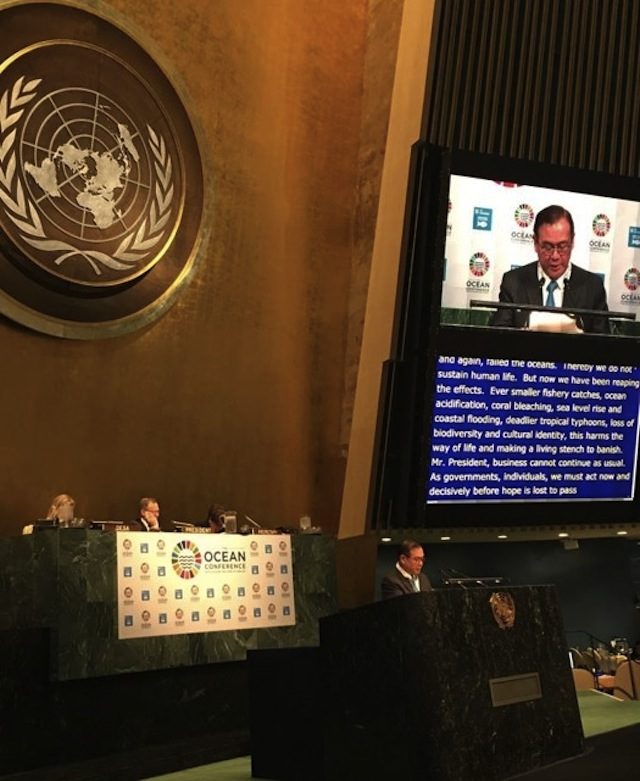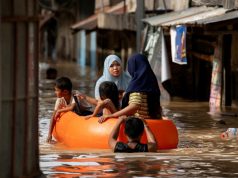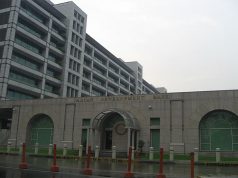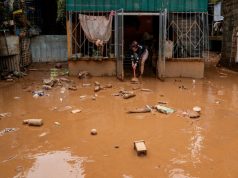
NEW YORK – As one of the countries bearing the impact of climate change and the price of neglecting the oceans, the Philippines has a real stake in the global effort to conserve and sustainably use seas and marine resources, and affirms its commitment to this.
The Philippines’ permanent ambassador to the United Nations in New York made this clear in a statement delivered to the world body at the recent observance of World Oceans Day.
As one of the planet’s largest archipelagos, the Philippines marked World Oceans Day by affirming multi-stakeholder partnership and support for the global agenda to conserve and sustainably use the oceans, seas and marine resources as a vital ecosystem to ensure human survival.
In his statement before world leaders, ministers and civil society participating in the United Nations Oceans Conference to implement Sustainable Development Goal 14 on the oceans, seas and marine resources, Ambassador to the UN Teodoro Locsin Jr reiterated the Philippine government’s commitment to the 2030 Agenda, and SDG 14 in particular.
“The Philippines sees the ocean not only as a source of life but life itself,” Locsin said, “Yet … we have time and again failed the oceans, whence came human life and the means whereby humanity sustains itself.”
“We have been reaping the effects – ever smaller fisheries catch, ocean acidification, coral bleaching, sea-level rise and coastal flooding, deadlier tropical cyclones brought on partly by ocean warming, loss of bio-diversity and cultural identity,” he added.
Locsin shared science-based evidence of the Philippines’ predicament of losing 167,000 hectares of its coastline – more than twice the size of New York City – because of rising sea levels that are three times the global average.
Climate change has contributed to rising sea levels. In response, the Philippine government has placed climate adaptation to the adverse effects of climate change at the core of the national agenda.
The Philippines is a State Party to the Paris climate accord.
To address these effects, Locsin cited the Philippines’ medium-term national development plan which integrates the 2030 Agenda, particularly SDG 14, through the sustainable management of natural resources using the ridge-to-reef approach, and the rationalization of marine protected areas to deter and eliminate illegal, unreported and unregulated fishing and habitat degradation.
He also cited legislation to strengthen the country’s Waste Management Act to curb land-based human and industrial waste – mainly plastics and micro-plastics –that find their way into and pollute the oceans.
Ambassador Locsin also highlighted respect for the UN Convention on the Law of the Sea, the need for greater capacity-building, along with education and traditional knowledge on oceans issues to address the challenges to the oceans.
The oceans conference brings together governments, the UN system, other intergovernmental organizations, international financial institutions, non-governmental organizations, civil society organizations, academic institutions the scientific community, the private sector, philanthropic organizations and other actors, to assess challenges, opportunities and actions taken towards the implementation of Goal 14.
Experts believe the conference to be a potential game-changer that will reverse the decline in the health of the oceans, and synergize the oceans’ relationship with other 2030 Agenda goals such as climate change mitigation, sustainable consumption and production patterns, hunger and food security, health risks linked to pollution and other harmful materials, and governance and the rule of law. Fiji and Sweden are chairing the conference.
Ambassador Locsin led the Philippine delegation to the conference which included members from the Department of Foreign Affairs, National Economic and Development Authority, Department of Environment and Natural Resources, Department of Agriculture, the Philippine Council for Agriculture and Fisheries, and the Philippine Fisheries Development Authority.









